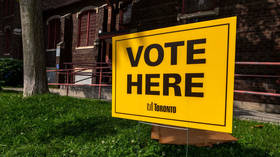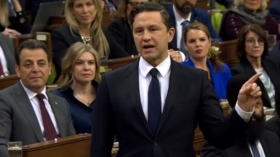Candidate gets zero votes to prove election point

A musician from Montreal has recorded a historic first for Canada, by receiving no votes while standing in a federal election.
Felix-Antoine Hamel put his name forward in Toronto-St. Paul, as part of a protest by the Longest Ballot Committee, a group that wants to reform the way Canada votes for its members of parliament. He ended up making history instead.
The Longest Ballot Committee was responsible for placing 77 out of the 84 candidates on Monday’s ballot, making it the longest in Canadian electoral history. The actual paper was a meter in length.
“When I saw the result, I was like, well, I am the true unity candidate. Everyone agrees not to vote for me,” the 45-year-old told the state broadcaster CBC. “I’m one of the last people that would be expected to make Canadian history in any way.”
Hamel’s is the first case a candidate has received no votes in a contested election since Canada was confederated in 1867. Previous no-vote candidates have run and won unopposed; the last such case was a 1957 by-election in Lanark, Ontario.
“The unusual dimensions of the ballot itself meant that some steps took more time than normal,” an Elections Canada spokesperson said, apologizing for compounding delays in counting the votes.
While six of the candidates received two votes each, Hamel was the only one with none – since, as a resident of Montreal, he could not even vote for himself.
“It’s our democracy, that’s how it works and it can be sometimes totally absurd,” he told the CBC. “As long as I have the right and the privilege to get zero votes in an election, then we are truly in a democracy.”
Prime Minister Justin Trudeau’s Liberal party has held the Toronto-St. Paul seat since 1983, but the Conservatives gained it on Monday in an upset victory. Much of the Canadian press has since debated what that might portend for Trudeau’s continued rule.
Like the US and the UK, Canada uses the ‘first-past-the-post’ system, in which whoever gets the most votes in a race wins, even if they don’t get the majority. Trudeau campaigned on abolishing the system after the 2015 election, but went back on that promise after his Liberals won in a landslide.














